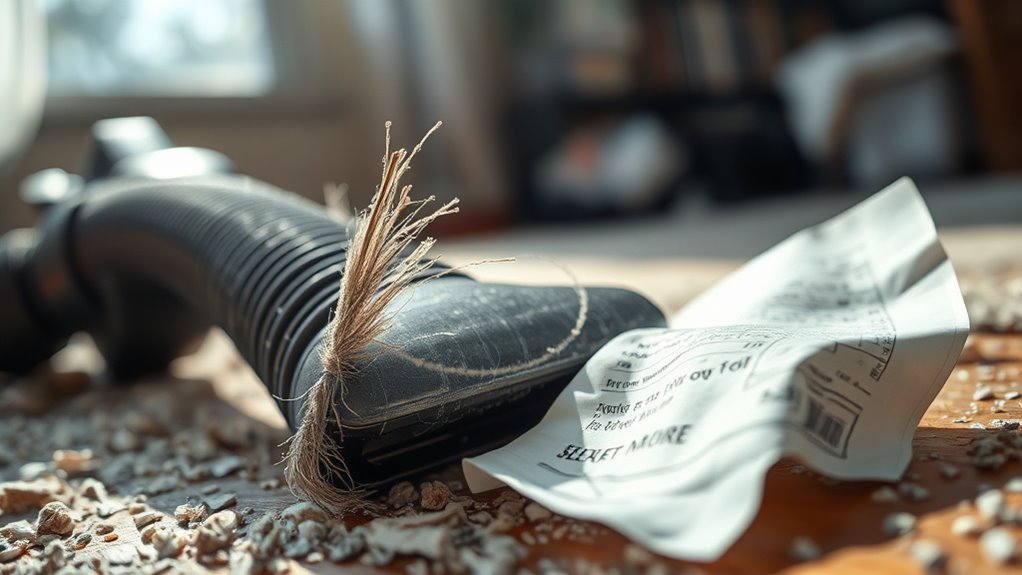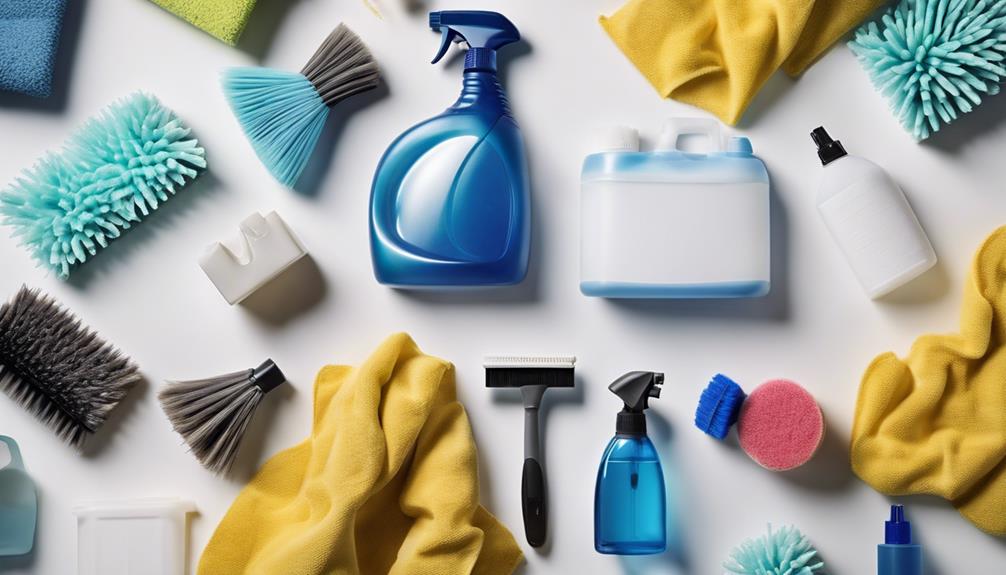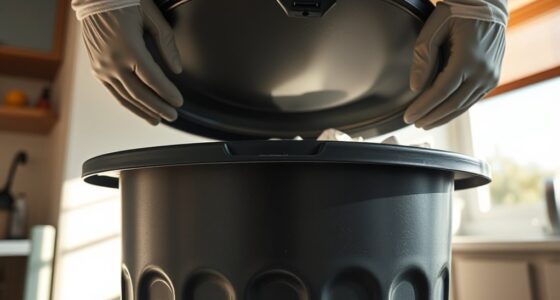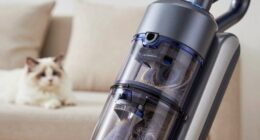While cheap vacuums seem like a quick way to save money, their hidden costs can accumulate fast. You might end up spending more on frequent repairs and replacements due to their short lifespan. Many budget models also lack proper filtration, which can deteriorate your air quality and health. Investing in a higher-quality vacuum may have a higher upfront price but saves you money and hassle in the long run. Discover the benefits of choosing wisely for your cleaning needs.
Key Takeaways
- Cheap vacuums often require frequent replacements due to their short lifespan, leading to higher long-term costs.
- Many budget models lack HEPA filters, negatively impacting air quality and potentially affecting health.
- Inexpensive vacuums may incur additional energy costs, offsetting initial savings with higher operational expenses.
- Regular maintenance needs of budget vacuums can result in time and money lost, unlike higher-quality options.
- Investing in durable vacuums reduces repair costs and enhances cleaning efficiency, ultimately saving money over time.
The Allure of Low Prices: Immediate Savings
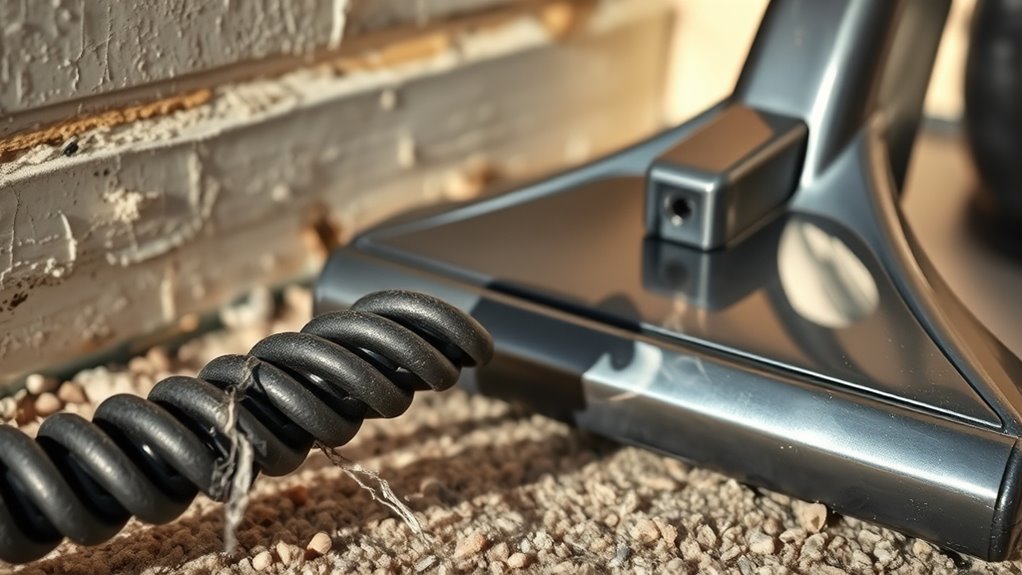
When you spot a cheap vacuum, it’s hard to resist the allure of immediate savings. With lower upfront costs, a cheaper vacuum cleaner can seem like a smart choice for budget-conscious shoppers looking to save money.
You might find decent performance for minimal cleaning needs, especially with clearance models that offer significant savings. However, it’s important to weigh the pros and cons.
Cheap vacuums are often associated with frequent repairs, which can lead to higher long-term costs. While you may initially save, investing in a quality model over $150 can provide better filtration and longevity, ultimately costing less to maintain over a long time. Additionally, many budget models lack HEPA filters that are crucial for allergen control, potentially impacting your home’s air quality. Moreover, inexpensive options may consume more energy than efficient models, leading to higher operational costs over time. A well-maintained vacuum can also promote better sleep quality by ensuring a cleaner environment free of dust and allergens. Furthermore, choosing energy-efficient appliances can lead to significant savings on utility bills in the long run. Regular cleaning and maintenance of your vacuum can also enhance its performance and lifespan, preventing costly repairs in the future.
Before you buy a cheap vacuum, consider the potential hidden costs.
Long-Term Costs: Repairs and Replacements
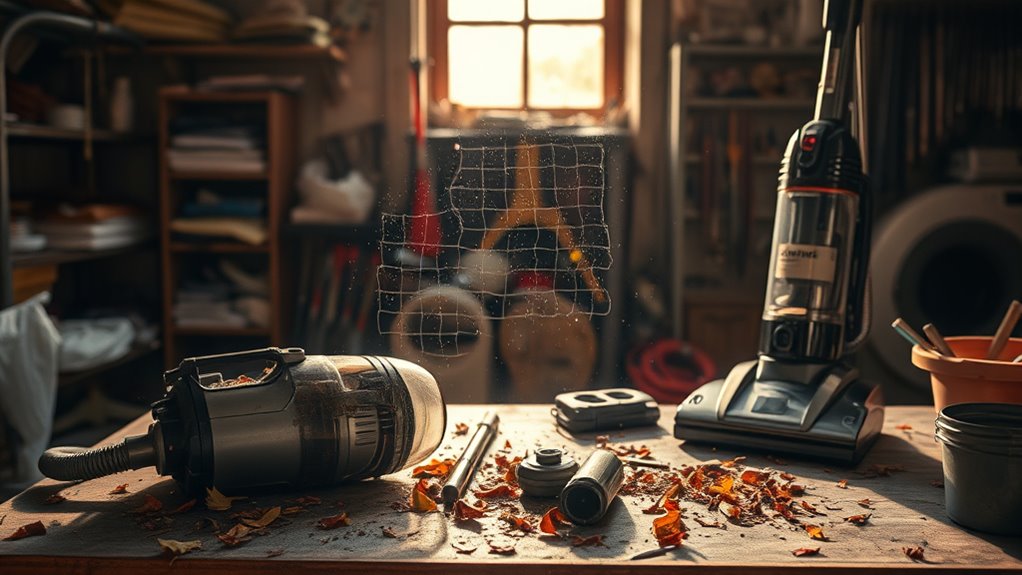
Although a cheap vacuum might seem like a bargain at first, the long-term costs associated with repairs and replacements can quickly add up. Cheap vacuums break more often, with a lifespan of just one to two years. In fact, many models offer high suction power without high costs, which can make them a better initial investment. Additionally, investing in a higher-quality vacuum can provide better filtration options that enhance air quality in your home. A well-constructed vacuum can also improve venting requirements for better overall performance.
You might find yourself facing additional costs for repairs, averaging between $50 to $150, which can exceed your initial savings. Many Cheap Vacuum Cleaners come with limited warranties, leaving you to cover repair expenses once they expire. Instead of consolidating costs, you may end up purchasing multiple cheap vacuums for different tasks. Investing in a higher-quality vacuum made from durable materials is often more cost-effective in the long run, minimizing repairs and ensuring longer-lasting performance. Additionally, advanced filtration systems can reduce allergens, further enhancing the value of your investment.
Impact on Air Quality: The Hidden Health Risks
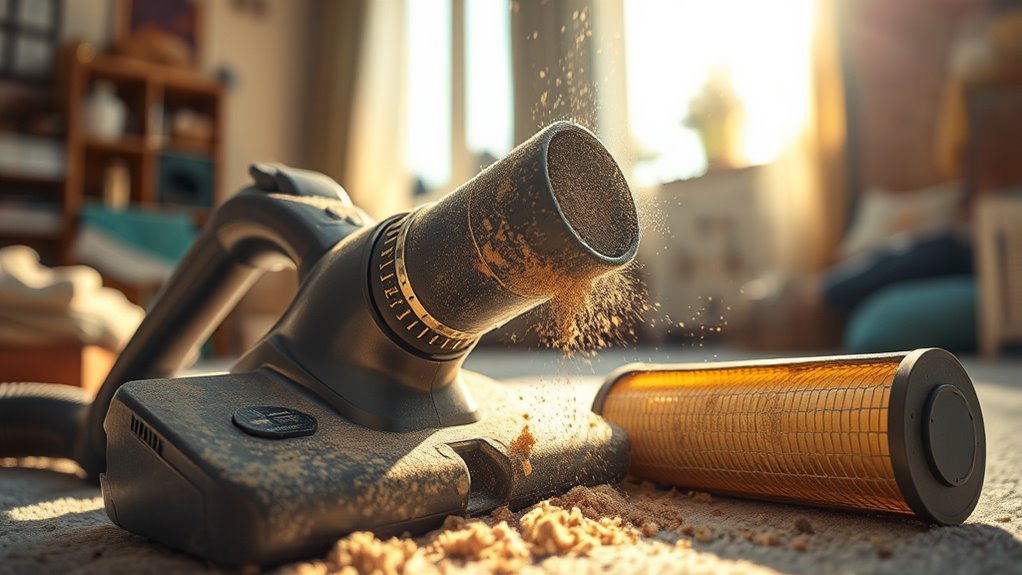
While you might think a cheap vacuum will save you money, it could actually harm your indoor air quality and pose hidden health risks.
Many budget-friendly vacuums claim to have a HEPA filter, but without effective filtration systems, they often release harmful particles back into your home. This leads to poor air quality, which can elevate allergens to unsafe levels. Regular use of air purifiers can help mitigate these risks by capturing harmful pollutants and improving overall indoor air quality. Homes without security systems are 300% more likely to be burglarized, similar to how inadequate vacuums can lead to a significant decline in air purity and safety. These vacuums may also fail to capture harmful pollutants, further compromising your indoor environment. Furthermore, using a vacuum with a HEPA filtration system is critical for effectively reducing airborne allergens and enhancing indoor air quality.
Testing shows that some cheap vacuums can even worsen air quality after minimal use, creating unpleasant odors as they recirculate dust instead of capturing it. By investing in vacuums over $150, you can guarantee better filtration capabilities that protect your health and maintain cleaner air. Additionally, effective filtration systems are essential for reducing allergens and improving overall well-being.
Don’t underestimate the importance of quality when it comes to your vacuum cleaner.
Cleaning Efficiency: Challenges With Hard Floors
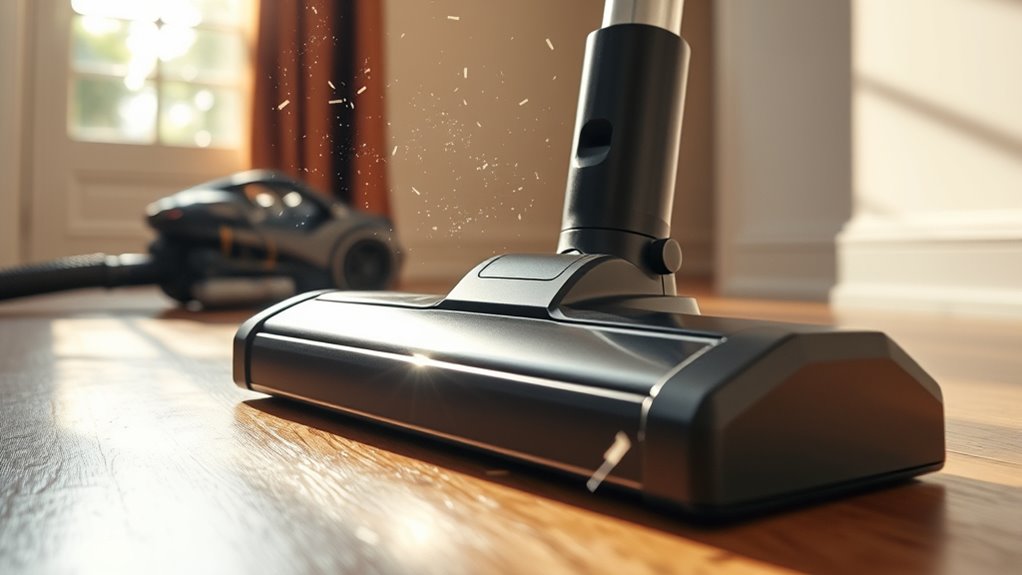
If you want to keep your hard floors looking their best, you might be disappointed with many budget vacuums. Cheap vacuums often struggle with cleaning efficiency, scattering debris instead of effectively cleaning your hard surfaces.
Most budget models were designed primarily for carpets, neglecting the specialized features needed for hard floor maintenance. Without a proper brush roll or squeegee, these vacuums result in poor performance, leading to user frustration. Only one vacuum under $100 has the necessary features for effective cleaning, highlighting the rarity of suitable budget options. Investing in a higher-quality vacuum with advanced filtration systems can save you time, effort, and money in the long run. Additionally, a vacuum with HEPA filters can significantly improve indoor air quality by reducing allergens and dust particles. Moreover, a vacuum with high suction power can tackle pet hair and debris effortlessly, making it an essential tool for maintaining clean hard floors. Furthermore, models with smart features can enhance your cleaning routine by allowing you to schedule cleanings and monitor performance remotely. A vacuum’s weight impacts maneuverability, making it easier to handle and clean efficiently.
When it comes to hard floors, investing in a higher-quality vacuum that meets your vacuum needs can save you time, effort, and money in the long run.
The Importance of Quality Features in Vacuum Cleaners
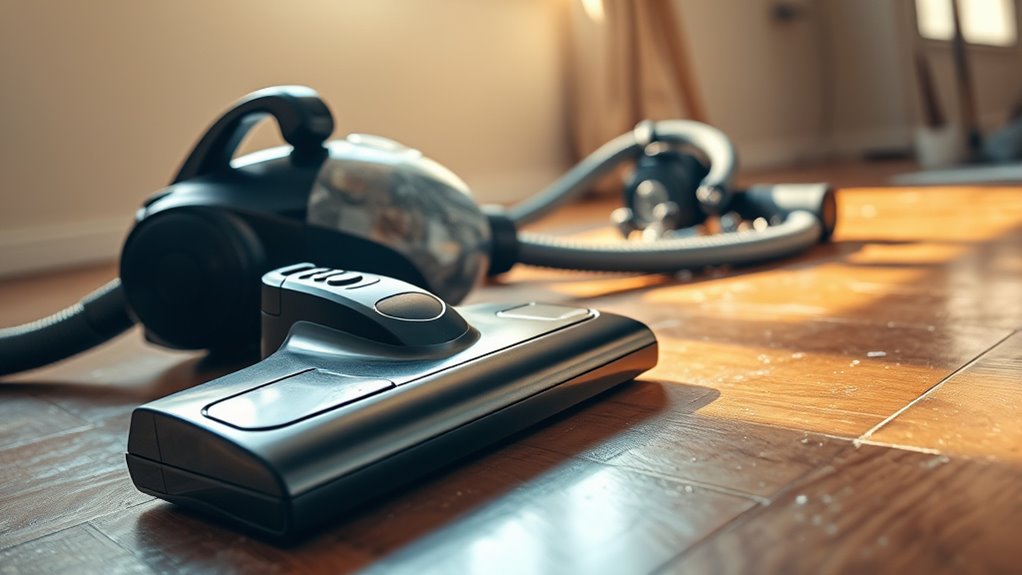
When you think about purchasing a vacuum cleaner, prioritizing quality features can make all the difference in your cleaning experience.
Investing in a vacuum with superior attributes means better performance and fewer headaches down the line. Consider these aspects:
- HEPA filtration for improved indoor air quality.
- Longevity and durability to reduce repair costs.
- Features that enhance Total House Cleaning efficiency.
- Better functionality for both carpets and hard floors.
While cheap vacuums may seem appealing, they often lead to ineffective cleaning and higher long-term costs. Additionally, using professional financial advice can help ensure you make informed decisions about your investments, just as you would with choosing a vacuum. Investing in quality appliances is akin to establishing a retirement savings plan that ensures long-term financial health. Regular maintenance, such as washing filters every 1-3 months, can also significantly extend the life of your vacuum.
Remember, buying a cheap vacuum could compromise health due to poor air quality. Additionally, investing in a high-quality vacuum can help maintain a healthy indoor environment by reducing allergens and dust particles in your home.
Opting for expensive vacuums with quality features guarantees you get effective, reliable performance, making your investment worthwhile.
Frequently Asked Questions
What Is the Best Vacuum Cleaner for Under $100?
If you’re looking for the best vacuum cleaner under $100, consider the Bissell CleanView Compact.
It’s affordable and performs well on both carpets and hard floors.
Another solid option is the Shark Rocket Corded Stick Vacuum, which is lightweight and great for tight spaces, though it may struggle with larger debris.
Just keep in mind that cheaper vacuums often lack essential features, so weigh your options carefully before deciding.
Why Are Vacuums so Expensive Now?
Vacuums are so expensive now due to rising manufacturing costs and the use of higher quality materials.
You’ll notice inflation and supply chain issues have also driven prices up.
Many modern vacuums feature advanced technology, like HEPA filters and smart capabilities, which add to their cost.
As consumer demand for effective cleaning solutions grows, manufacturers invest in research and sustainable practices, increasing the overall price of these essential appliances.
Do You Need an Expensive Vacuum?
“You get what you pay for” certainly rings true when it comes to vacuums.
Do you need an expensive vacuum? If you’re serious about maintaining clean air and tackling various surfaces, investing in a higher-quality model can make a big difference.
It’ll often come with better filtration, durability, and versatility. Cheaper options might save you money upfront, but they can lead to more hassle and costs down the line.
Choose wisely!
Do Vacuums Use a Lot of Electricity?
Yes, vacuums can use a fair amount of electricity. Depending on the model, they typically consume between 500 to 1500 watts.
If you run your vacuum for an hour, you might spend around $0.06 to $0.18, depending on your electricity rate.
Bagless models often require more energy to maintain suction.
If you’re concerned about costs, consider energy-efficient options that can help reduce your utility bills while still keeping your space clean.
Conclusion
When you opt for a cheap vacuum, you might think you’re saving money, but consider this: studies show that low-quality vacuums can cost you up to 50% more in repairs and replacements over time. Investing in a quality vacuum not only enhances your cleaning efficiency but also improves your home’s air quality. So, instead of chasing that low price, think long-term. Your wallet and your health will thank you for choosing wisely.
